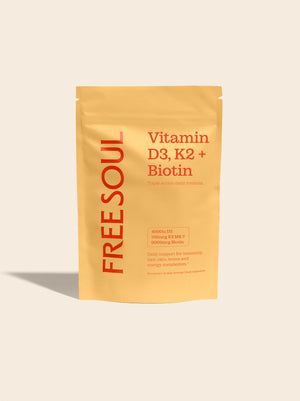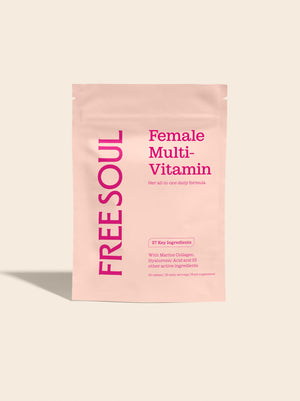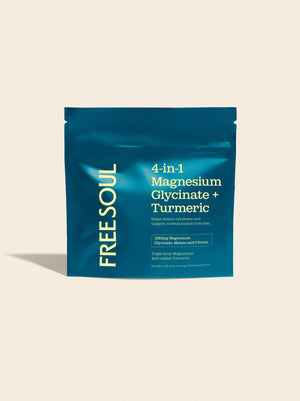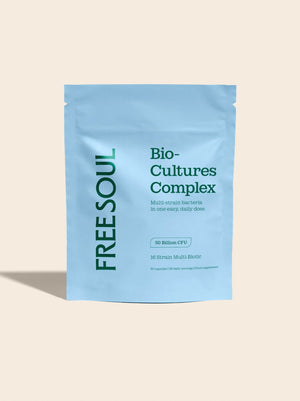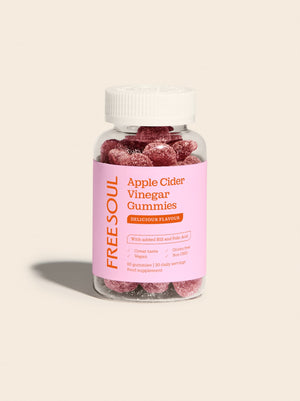You’ve probably seen it all over your feed: glowing skin selfies, collagen coffee, liquids, and powders that claim to do it all. But does marine collagen actually deliver? We asked Natalie Rouse, Registered Nutritionist (RNutr) and Head of Nutrition at Free Soul, to break it down.
“Not every beauty product lives up to the hype, but marine collagen has been widely studied,” says Natalie. “Understanding the benefits of marine collagen and what a quality supplement should look like can help you decide whether it deserves a place in your routine.”
What is Marine Collagen?
Marine collagen comes from fish scales, skin, or bones. It’s mostly made up of Type I collagen, the form that your skin, hair, and nails contain the most of. What makes it a popular choice for beauty supplements is its high bioavailability, as it has smaller peptides that are easily absorbed by the body.
How does it compare to other types?
- Marine collagen – Smaller peptides, rich in Type I collagen, often chosen for skin-focused support
- Bovine collagen – Larger peptides, a mix of Type I and III collagen, suited for all-around support, including joints
- Plant-based collagen – Technically not collagen, but a blend of amino acids often paired with vitamin C to support your body’s own production
“The high concentration of Type I collagen in marine sources has made it a focus for skin research,” says Natalie. “Naticol® Marine Collagen, for example, has been clinically studied, with results suggesting improvements in hydration and the appearance of wrinkles.”
For a deeper dive into how collagen works in the body, see our article: “What is collagen and why do I need it?”
What does Marine Collagen do?
When you take marine collagen, your body breaks it down during digestion into smaller peptides and amino acids. Once in your bloodstream, these get to work in a number of ways:
- Act as building blocks – Your body reuses these amino acids to build new collagen and other structural proteins
- Activate fibroblast activity – Some peptides act like messengers, stimulating the skin's fibroblasts (the cells that produce collagen, elastin, and hyaluronic acid) to step up production
- Support hydration – Research has linked collagen peptides to improvements in skin barrier function, which helps skin stay hydrated
“Marine collagen can act as both signal and supply,” says Natalie. “It provides the amino acids your body can use, while also prompting your cells to get to work making more of their own collagen. That’s why consistent use matters, you don’t see instant results, but over time it gives your skin steady support from within,”
Marine Collagen benefits
Let’s take a look at what the marine collagen benefits really are.
Skin hydration and elasticity support
Type I collagen, which is the primary form in marine collagen, is also the most dominant type in the dermis (the middle layer of the skin). It provides structure and smoothness to the skin, with marine collagen supplementation studies indicating it may improve hydration, elasticity, and the appearance of wrinkles. That’s what makes it one of the most popular beauty from within ingredients.
Hair and nail strength
Collagen peptides break down into the amino acids that your body uses to build keratin, the main structural protein in your hair and nails. Marine collagen has been studied for its role in reducing nail brittleness and supporting normal growth, while many users have also reported noticing improvements in hair thickness and shine after regular use.
Joints and bone maintenance
While best known for skin, Type I collagen is also present in bones and connective tissues. Some research has found that supplementation may play a role in supporting mobility as we age.
Easy absorption
Marine collagen peptides are naturally smaller than those from bovine sources, making them easier for the gut to absorb and to circulate in the bloodstream. This higher bioavailability is one reason marine collagen is often chosen for beauty-led goals.
Clean and sustainable source
Marine collagen is derived from fish byproducts, like skin and scales, which would normally go to waste. For many, that makes it not just a beauty choice, but a more sustainable one compared to bovine collagen, which comes from cattle farming.
Should you be taking it? Here’s what the Nutritionist says
“Collagen production naturally begins to decline in your mid-20s, and that rate only increases with age. For women, the hormonal shifts that come with perimenopause and menopause can further impact collagen production. Lifestyle factors also come into play, with UV exposure, stress, poor sleep, and a diet low in protein all potentially accelerating the breakdown of collagen. If any of those apply to you, marine collagen is a good choice. While not a quick fix, it's a simple and bioavailable way to give your skin ongoing support, with research suggesting daily use may benefit skin hydration and firmness after 8-12 weeks,” says Natalie.
What are the benefits of taking a Marine Collagen supplement?
It’s hard to get a meaningful amount of collagen from diet alone. Traditional sources, like bone broth or fish skin, contain collagen, but not in the concentrated and most bioavailable form your body can use.
A good marine collagen supplement will be hydrolysed (broken down into smaller peptides), which makes it easier for your body to absorb. This gives you a consistent, measurable dose that diet alone can’t always deliver.
It’s also far more convenient. No need to spend time over the stove making broth, a daily serving of marine collagen provides a steady supply of amino acids your body can use to support your skin, hair, nails, and connective tissues.
What to look for in a Marine Collagen Supplement
There are a lot of different options out there, and they’ll all claim to be the best. So what really indicates a good supplement?
- A sufficient dose — Look for at least 5g of marine collagen, as that’s in the range most studied for skin benefits
- Hydrolysed collagen — Hydrolysis breaks the peptides down into smaller peptides, so your body can absorb it more easily
- No unnecessary extras — Avoid excessive sugar, fillers, and artificial additives
- Supportive ingredients — Look for complementary extra ingredients like vitamin C and hyaluronic acid
“Collagen also works best when your body has the right environment to use it,” says Natalie. ”This means a steady intake of protein, plus antioxidants like vitamin C, which directly supports collagen formation and helps protect your cells from the oxidative stress that breaks collagen down. Supplements can provide the peptides, but they can do their job better with a supportive wider diet”.
Want to learn more?
-
What is collagen and why do I need it?
-
4 daily habits for glowing skin
-
Marine Collagen vs. Bovine: Which is best for Skin?



